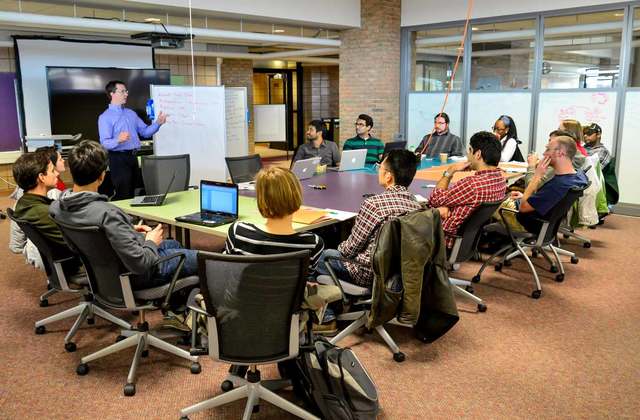(单词翻译:单击)
听力文本
Students of Color Face Challenges in STEM
Dominique, not her real name, is a Black electrical engineering doctoral student. She found herself in a difficult situation at a conference.
A white man thought a nearby Black woman was a hotel cleaner and asked her to clean their table. The woman did as she was asked, but she also told him that she was the main speaker at the conference. The man did not say he was sorry. He made a joke about how the woman could have two jobs.
Other white people at the table looked at Dominique waiting for her to approve of the joke. Dominique was not prepared for this. She acted as if she was laughing. The others laughed, too, but their laughter sounded real to her.
Leon, also not his real name, is a Black doctoral computer science student. He was picking up a visiting female professor at the airport. He had spoken to her over the phone several times. When Leon approached the professor, she backed away and asked him to call his doctoral adviser to confirm his identity.
Ebony O. McGee teaches diversity at Vanderbilt University. She says stories like this are common. She has collected about 300 of them in her research over the past ten years on structural racism in STEM fields: science, technology, engineering and math. As a result of these incidents, she says, many Black and Hispanic students leave the STEM fields.
McGee says the students spend much of their energy on so-called "stereotype management." It means they have to take specific actions to deal with unfair and untrue beliefs they face as a result of their identity.
These students, she says, have to deal with a mainly white STEM community in which they are seen as unskilled and undeserving of opportunities.

McGee has found that the stereotypes also give Black and Hispanic students a stronger reason to succeed and, at times, to become the best at what they do. They want to disprove the idea that they are not worthy of being in STEM fields.
Sometimes stereotype management involves putting certain things on display, like leaving a high test score on a STEM test on a desk for others to see.
It can also involve keeping certain things hidden. Some Black students report that they kept their own children hidden to avoid the stereotype of single Black mothers. McGee says some STEM professors do not want to work with such students. They mistakenly believe they will have less time to work in the laboratory than students who are not parents.
In her recent book on STEM education, she says it takes much of their energy and uses resources that could help them be creative. And that extra attention to stereotype management can cause problems with their mental and physical health.
That leads to them leaving STEM. Research shows that Black and Hispanic students leave the fields at nearly twice the rate of white students.
McGee says the answer is not to have more students of color featured on university websites or other publications. Higher education must pay more attention to the students' college experience, their well-being, and how others view them. She says more attention should be paid to the reasons that students of color stay in STEM programs than the reasons why so many leave.
McGee's future projects involve students creating their own STEM businesses, she said, "where Black folks can stop begging these white companies for a job and create their own kind of ecosystem."
I'm Jill Robbins.
重点解析
重点讲解:
1. make a joke 开玩笑;说笑话;
But he'd always just make a joke.
但他一直都开玩笑。
2. pick up 接载;取走;
We drove to the airport the next morning to pick up Susan.
我们第二天早晨开车去机场接苏姗。
3. at times 有时候;时常;
At times, the heat was barely tolerable.
有时天气炎热得几乎令人难以忍受。
4. pay attention to 重视;对……注意;
Please pay attention to what I am saying.
请注意听我讲的话。
参考译文
有色人种学生在STEM教育中面临挑战
多米尼克(化名)是一名攻读电气工程博士学位的黑人学生,她在一次会议上陷入困境。
一名白人以为身旁的黑人女性是酒店清洁工,并要求她清洁餐桌。这位女士照他的要求做了,但她也告诉他,她是会议的主要发言人。那位男士没有道歉,他开玩笑说这位女士怎么有两种工作。
桌上的其他白人看着多米尼克,等待她对这个笑话表示赞许,多米尼克没有为此做好准备。她表现得好像在笑,其他人也笑了,但是他们的笑声对她来说是真实的。
莱昂(化名)是攻读计算机科学博士学位的学生,他正在机场接一名客座女教授。他已经与她通过好几次电话,当莱昂走进这位女教授时,她退后一步,要求他打电话给他的博士生顾问以确认他的身份。
乌木·麦吉在范德比尔特大学教授多门课程,她说这样的故事很普遍。在过去的十年中,她在STEM领域的结构种族主义研究中收集了大约300篇文章,这些领域包括科学、技术、工程和数学。她说,由于这些事件,许多黑人和西班牙裔学生离开了STEM领域。
麦基说,学生们把他们的大部分精力花在所谓的“刻板印象管理”上,这意味着他们必须采取具体行动来处理他们因身份而面临的不公和无事实根据的信仰。
她说,这些学生必须面对主要是白人的STEM团体,在这样的团体中他们被视为无专门技术,不配得到各种机会。
麦基发现,这些刻板印象也给黑人和西班牙裔学生一个更有力的获取成功的理由。有时,会使他们成为所在领域的佼佼者。他们想对他们不配待在STEM领域的观点进行反驳。
有时候,刻板印象管理包括把某些东西摆出来,比如把STEM测试的高分放在桌子上让别人看见。
也可能涉及隐藏某些东西。一些黑人学生报告说,他们把自己的孩子藏起来,避免产生单身黑人母亲的刻板印象。麦基说,一些STEM课程的教授不想和这样的学生合作。他们错误地认为,他们在实验室工作的时间会比那些不是父母的学生少。
她在最近出版的关于STEM教育的书中说道,这需要他们花费大量精力,并利用有助于他们发挥创造力的资源。对刻板印象管理的额外关注会给他们的身心健康带来问题。
这导致他们离开STEM课程。研究表明,黑人和西班牙裔学生离开该项目的比率几乎是白人学生的两倍。
麦吉说,答案不是要在大学网站或其他出版物上报道更多有色人种学生的事情。高等教育必须更多地关注学生的大学经历,他们的福祉以及其他人对他们的看法。她说,要应该更多地关注有色人种学生留在STEM项目中的原因,而不是去关注很多人为什么离开该项目。
她说,麦吉未来的项目包括让学生们创建自己的STEM企业,“黑人可以不再向这些白人公司讨要工作,而是去创建自己的产业生态系统。”
吉尔·罗宾斯报道。
译文为可可英语翻译,未经授权请勿转载!


